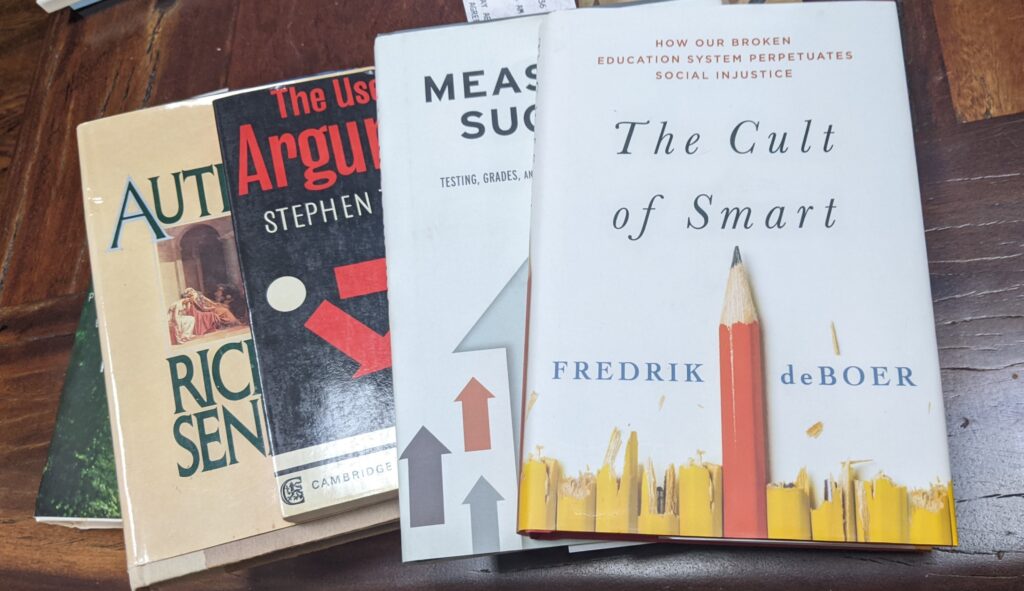
If this post is shorter today, I swear that it’s not just because two NFL playoff games start shortly. After all, being a New York Jets fan, my season ended sometime in September. It’s because the purpose of this blog and its subset of 31 consecutive January jolts can be served that are at times by introducing other voices to my audience. Voices who know more than I do and hold at least some opinions different from my own in this domain of testing. An important thinker and writer in this area is Freddie DeBoer. If you don’t know Freddie’s work, he is a Marxist with a PhD from Purdue University whose book blurb describes his style as “anti-tribal”. He’s also astonishingly insightful about issues of education; the astonishment is that it is not the only thing upon which he writes for perhaps even his main subject.
Somehow, I first came across Freddie when he was blogging on a different platform. His intelligent and sometimes searing posts on education fascinated me. Then he took some time off before popping up on Substack. One way to measure my admiration for him is that I, the evangelist for all of the Internet always being free, paid for a subscription, which you don’t have to do to get to know his work because he distributes so much of his material for free.
Freddie DeBoer writes a fair amount about education as you could see at this link here and frequently about testing and there are our views do more than overlap. This piece, Educational Assessments are Valid, Reliable, and Remarkably Predictive about testing explains and defends concisely and compellingly.
Or you can listen to him on many podcasts. Here is the most recent example from McGill University. MIR Meets: Freddie deBoer. And here he is on video with my favorite current Philosopher Agnes Callard talking about meritocracy — a topic to which this blog discussion will return in depth.
Freddie also wrote a book a couple of years ago called The Cult of Smart. Here’s a taste of his provocative thinking in that volume:
“Because regardless of the specific influences, we cannot achieve anything like equality in the classroom. Hundreds of years of pedagogy and hundreds of billions of dollars, the efforts of dozens of think tanks and scores of university departments, billions of concerned parents and armies of teachers, principals, and counselors have not been sufficient to create equality in education. If aliens came to Earth tomorrow and observed our education system, the first observation they would make is that students are not equal but rather sorted into a distribution, and that at scale and in general students remain in a particular performance band for their academic lives. We can indulge in fantasies about what we might be able to achieve in some other universe, but no serious person believes that we will achieve educational equality in our lifetimes. And if we recognize that the folly of blaming students or teachers for their outcomes becomes clear.”
Three quick comments
- I’m not sure that I agree with this statement or even with a lot of the book
- I’m not a Marxist, but if I keep on reading Freddie who knows?
- One of my abiding principles is that if you only read people with whom you agree then you’re not going to learn very much.
Part of what’s great about reading Freddie is that he is bumping up against other people — the worldly, so smart, anointed people and the rest of us —engaging all in debate. Debate of the kind that Freddie practices — true debate, not yelling at each other, not ad hominem comments, not the peddling of received wisdom, not snark is really quite useful. (Okay, he is funny in these debates so maybe there’s a smidgen of Snark)
Consider Freddie’s engagement on the subject of Pre-k here and then balance it with the actual Brookings report here
So, I advise you to read Freddie because much of what Freddie writes makes tremendous sense to me including this little gem:
“Knowingness is a cancer: if you must signal to everyone constantly that you already know everything, you must never appear to be doing the work to find out what you are supposed to know.”
Until tomorrow then, my friends, when I will prove again that I don’t know everything even about testing as we delve into biases in grading and testing
I am quite happy to admit that I don’t know everything about my field, even after decades of working in it (and don’t forget all that time I spent as a student in the system too, which of course makes me an expert!). In fact, it’s one of the things I love about it – there is always more to learn, debate, discuss… I ALWAYS learn something from each and every one of my students, which is a joy, and I am finding out that my fellow postgrads (both doctoral students and masters students) are a great source of wisdom – even if we don’t always agree, as you say. Thanks for introducing me to Freddie’s work – lots to read!